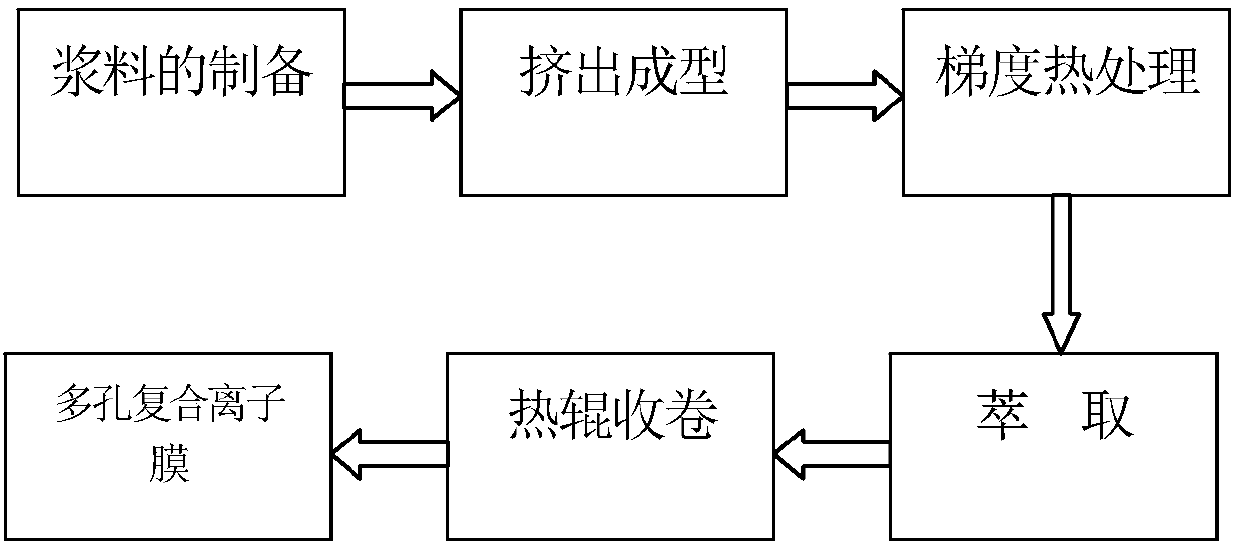Preparation method of composite membrane
A composite membrane and polymer technology, used in fuel cells, electrochemical generators, electrical components, etc., can solve the problems of high vanadium ion permeability of perfluorosulfonic acid proton exchange membranes and low production efficiency of domestic diaphragm preparation processes. , to achieve the effect of good ion selective permeability, good electrical conductivity and cost reduction
- Summary
- Abstract
- Description
- Claims
- Application Information
AI Technical Summary
Problems solved by technology
Method used
Image
Examples
Embodiment 1
[0025] Dissolve 10kg perfluorosulfonic acid resin and 0.3kg polyvinylidene fluoride (PVDF) resin in 100L dimethylacetamide (DMAC), the melt flow rate of polyvinylidene fluoride resin is 10-20g / min, PVDF The vinyl fluoride resin should be dried at 90-110°C for 24 hours before melting. Heat and stir at 200°C for 5-8 hours to dissolve into a gel, add 200 mL of the additive dibutyl phthalate to the mixed solution, stir for 1-3 hours and vibrate in an ultrasonic oscillator for 1-2 hours to make The solution is refined and the tiny bubbles in it are removed, the gel material is put into the extruder and extruded at 170-250°C through the abrasive tool, and then the film is put into 180-200°C, 100-140°C, 60-80°C Gradient heat treatment is carried out in three temperature sections from high to low (its function is to control the volatilization speed of the solvent and the leaching speed of the extractant). After heat treatment, the membrane enters the mixed solution of the extraction a...
Embodiment 2
[0029] Dissolve 10kg perfluorosulfonic acid resin and 0.3kg polybenzimidazole resin in 100L dimethyl sulfoxide, the melt flow rate of polybenzimidazole resin is 5-15g / min, polybenzimidazole resin melts It should be dried at 80-100°C for 24 hours before drying. Heat and stir at 200°C for 5-8 hours to dissolve into a gel, add 400 mL of additive polyvinyl alcohol into the mixed solution, stir for 1-3 hours and vibrate for 1-2 hours in an ultrasonic oscillator to refine the solution and Drive out the tiny air bubbles in it, put the gel material into the extruder and extrude at 170-250°C through the abrasive tool, and then enter the film into three temperature sections of 180-200°C, 100-140°C, and 60-80°C Carry out gradient heat treatment from high to low. After heat treatment, the membrane enters the mixed solution of extractant ethanol and deionized water for extraction, takes out the membrane and washes it with deionized water, and puts the ion exchange membrane into the drying ...
Embodiment 3
[0033] Dissolve 10kg perfluorosulfonic acid resin and 0.3kg polysulfone resin in 100L of N-methylpyrrolidone, the melt flow rate of polysulfone resin and polyethersulfone resin is 20-30g / min, polysulfone resin and polyether The sulfone resin should be dried at 100-120°C for 24 hours before melting. Heat and stir at 200°C for 5 to 8 hours to dissolve into a gel, add 100 mL of the additive polyvinylpyrrolidone to the mixed solution, stir for 1 to 3 hours and vibrate in an ultrasonic oscillator for 1 to 2 hours to refine the solution and Drive out the tiny bubbles, put the gel material into the extruder and extrude at 170-250°C through the abrasive tool, and then enter the film into three temperature sections of 180-200°C, 100-140°C, and 60-80°C Carry out gradient heat treatment from high to low. After heat treatment, the membrane enters the mixed solution of extractant ethanol and deionized water for extraction, takes out the membrane and washes it with deionized water, and puts...
PUM
| Property | Measurement | Unit |
|---|---|---|
| pore size | aaaaa | aaaaa |
| thickness | aaaaa | aaaaa |
| melt flow index | aaaaa | aaaaa |
Abstract
Description
Claims
Application Information
 Login to View More
Login to View More - R&D
- Intellectual Property
- Life Sciences
- Materials
- Tech Scout
- Unparalleled Data Quality
- Higher Quality Content
- 60% Fewer Hallucinations
Browse by: Latest US Patents, China's latest patents, Technical Efficacy Thesaurus, Application Domain, Technology Topic, Popular Technical Reports.
© 2025 PatSnap. All rights reserved.Legal|Privacy policy|Modern Slavery Act Transparency Statement|Sitemap|About US| Contact US: help@patsnap.com

